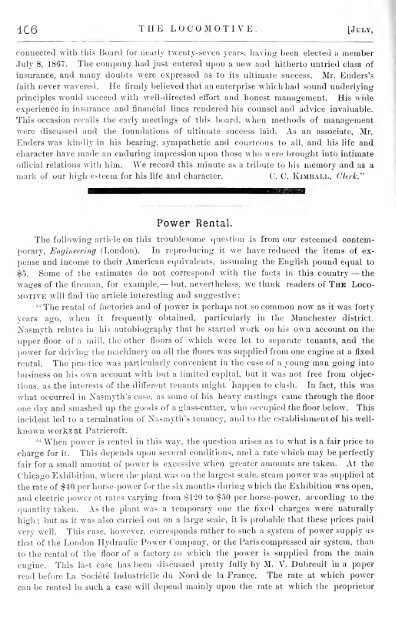The Locomotive - Lighthouse Survival Blog
The Locomotive - Lighthouse Survival Blog
The Locomotive - Lighthouse Survival Blog
You also want an ePaper? Increase the reach of your titles
YUMPU automatically turns print PDFs into web optimized ePapers that Google loves.
1C6 THE LOCOMOTIVE. [July,<br />
connected with this Board for nearly twenty-seven years, having been elected a member<br />
July 8, 1867. <strong>The</strong> company had just entered upon a new and hitherto untried class of<br />
insurance, and many doubts were expressed as to its ultimate success. Mr. Enders's<br />
faith never wavered. He firmly believed that an enterprise which had sound underlying<br />
principles would succeed with well-directed effort and honest management. His wide<br />
experience in insurance and financial lines rendered his counsel and advice invaluable.<br />
This occasion recalls the early meetings of this board, when methods of management<br />
were discussed and the foundations of ultimate success laid. As an associate, Mr.<br />
Enders was kindly in his bearing, sympathetic and courteous to all, and his life and<br />
character have made an enduring impression upon those who were brought into intimate<br />
official relations with him. We record this minute as a tribute to his memory and as a<br />
murk of our high esteem for his life and character. C. C. Kimball, Clerk.''''<br />
Power Rental.<br />
<strong>The</strong> following article on this troublesome question is from our esteemed contem-<br />
porary, Engineering (London). In reproducing it we have reduced the items of ex-<br />
pense and income to their American equivalents, assuming the English pound equal to<br />
$5. Some of the estimates do not correspond with the facts in this country — the<br />
wages of the fireman, for example,— but, nevertheless, we think readers of <strong>The</strong> <strong>Locomotive</strong><br />
will find the article interesting and suggestive<br />
"<strong>The</strong> rental of factories and of power is perhaps not so common now as it was forty<br />
years ago, when it frequently obtained, particularly in the Manchester district.<br />
Nasmyth relates in his autobiography that he started work on his own account on the<br />
upper floor of a mill, the other floors of which were let to separate tenants, and the<br />
power for driving the machinery on all the floors was supplied from one engine at a fixed<br />
rental. <strong>The</strong> practice was particularly convenient in the case of a young man going into<br />
business on his own account with but a limited capital, but it was not free from objections,<br />
as the interests of the different tenants might happen to clash. In fact, this was<br />
what occurred in Nasmyth's case, as some of his heavy castings came through the floor<br />
one day and smashed up the goods of a glass-cutter, who occupied the floor below. This<br />
incident led to a termination of Xasmyth's tenancy, and to the establishment of his wellknown<br />
works at Patricroft.<br />
"When power is rented in this way, the question arises as to what is a fair price to<br />
charge for it. This depends upon several conditions, and a rate which may be perfectly<br />
fair for a small amount of power is excessive when greater amounts are taken. At the<br />
Chicago Exhibition, where the plant was on the largest scale, steam power was supplied at<br />
the rate of $40 per horse-power for the six months during which the Exhibition w T as open,<br />
and electric power at rates varying from $120 to $50 per horse-power, according to the<br />
quantity taken. As the plant was a temporary one the fixed charges were naturally<br />
high; but as it was also carried out on a large scale, it is probable that these prices paid<br />
very well. This case, however, corresponds rather to such a system of power supply as<br />
that of the London Hydraulic Power Company, or the Paris compressed air system, than<br />
to the rental of the floor of a factory to which the power is supplied from the main<br />
engine. This last case has been discussed pretty fully by M. V. Dubreuil in a paper<br />
read before La Societe Industrielle du Nord de la France. <strong>The</strong> rate at which power<br />
can be rented in such a case will depend mainly upon the rate at which the proprietor<br />
:
















